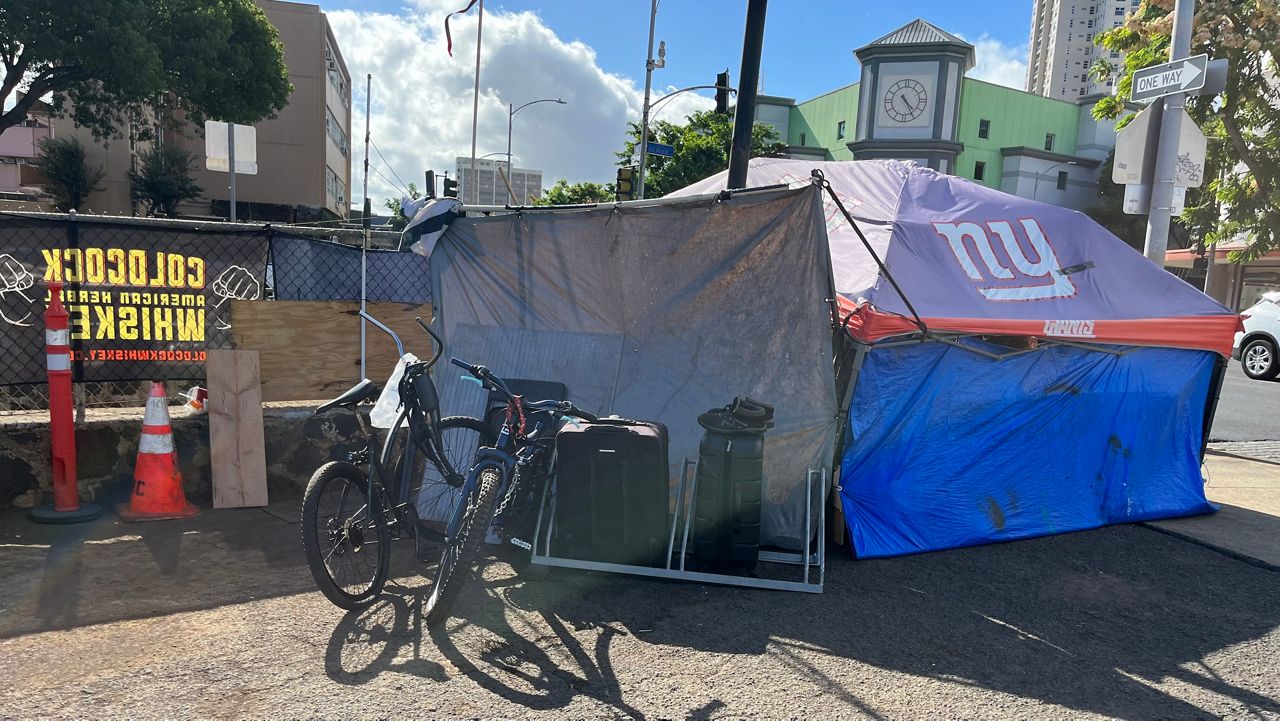HONOLULU — Five homeless individuals have filed suit against the City and County of Honolulu alleging its ongoing sweeps of homeless encampments and “anti-houseless laws and enforcement actions” violate their civil rights.
The plaintiffs — Gina Mahelona, Desmond Canite, Jared Castro, Faimafili Tupuola and Michael Bryan — filed a class-action complaint in Hawaii First Circuit Court on Wednesday on behalf of themselves and more than 2,000 Oahu residents who experience homelessness and are subject to similar treatment by the city. They are represented by the American Civil Liberties Union of Hawaii and Goldstein, Borgen, Dardarian and Ho.
The suit seeks to put an end to targeted enforcement actions like sweeps, citations and arrests that they say criminalize homeless individuals who lack a realistic alternative for shelter.
Hawaii has the fifth highest rate of homelessness in the United States at 41.43 per 10,000 people, according to the U.S. Department of Housing and Urban Development. That rate is driven by Native Hawaiians and Pacific Islanders, who as an ethnic group have the highest rate of homelessness at 121 per 10,000 people.
The ACLU notes a huge disparity between the more than 2,300 people who lack shelter on any given night on Oahu versus the 50 or so vacancies at local shelters. Based on that, the lawsuit contends that the city’s enforcement of criminal laws prohibiting sleeping, sitting, lying or having public possessions in public spaces constitutes cruel or unusual punishment. It also alleges that enforcement actions violate fundamental rights of free movement and due process.
“People experiencing houselessness have the same fundamental rights under the U.S. and Hawaii Constitutions as those who are lucky enough to have housing and shelter, yet the day-to-day reality regarding the exercise of those rights is much different for our houseless neighbors,” said ACLU of Hawaii legal director Wookie Kim. “Our plaintiffs and houseless neighbors are denied these fundamental rights, and other constitutional guarantees, far more flagrantly and far more often than housed people. The city is essentially penalizing houseless people for their very existence.”
Castro said he has received more than 200 violations over the past three years for offenses like failing to comply with a park sign, sleeping on the sidewalk and storing property in public spaces. Many of those citations led to arrest and incarceration, which resulted in the loss of his personal property, Castro said.
“The sweeps are stressful for me,” he said. “It makes me feel awful to be singled out by the city and its police officers all of the time. These are things that we go through on a regular basis, and I am sad to report that interactions like these are my normal.”
Fellow plaintiff Tupuola said seizure, confiscation and destruction of personal property during sweeps exacerbate the already tenuous situations of many homeless individuals.
“People have things that are necessary to them — shelter, work clothes, stuff like that,” Tupuola said. “I have all those things out here. In the blink of an eye, it’s gone. I can go to the store and come back and it’s gone.”
ACLU of Hawaii staff attorney Taylor Brack said the city’s actions are counterproductive toward its goal.
“Far from promoting safety and sanitation, criminalizing houselessness only perpetuates the cycle of poverty,” Brack said. “Being needlessly thrown into the criminal justice system makes it more unlikely that houseless people will be able to finish school, find and maintain employment, access healthcare and connect with service providers.”
Michael Tsai covers local and state politics for Spectrum News Hawaii. He can be reached at michael.tsai@charter.com.



